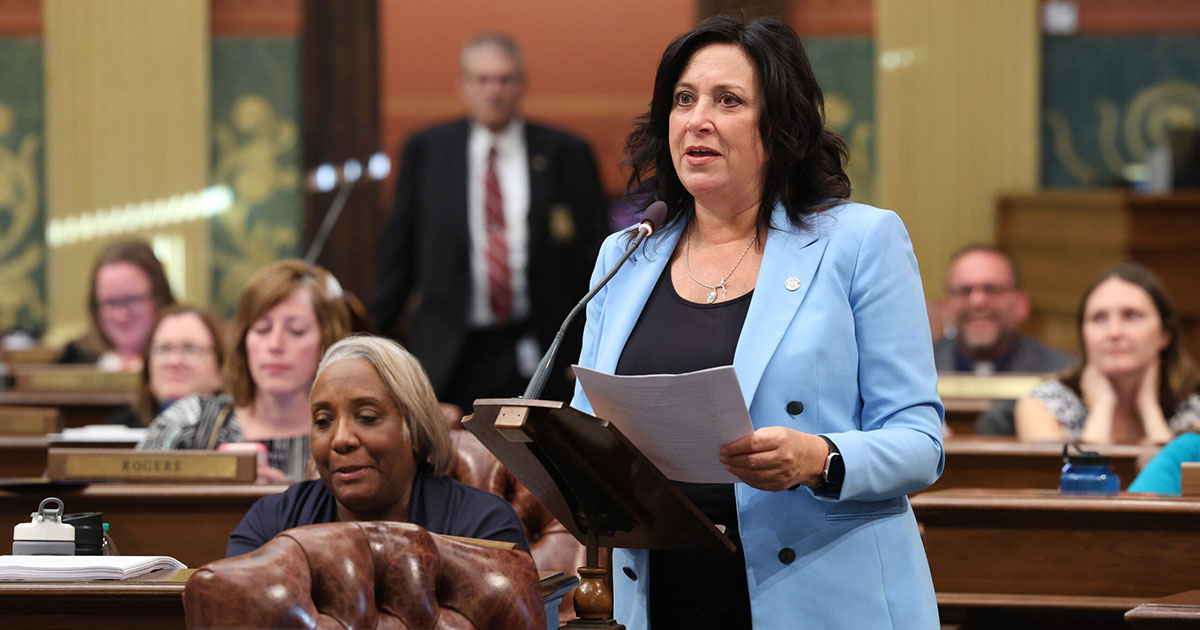Mid-year budget bills fund clean water, education, talent development
LANSING, Mich., Nov. 3, 2023 — Michigan House Democrats celebrated the passage of two budget bills that will have a positive impact on families across the state. House Bill 4292 and Senate Bill 174 were carefully crafted to address various needs — such as access to clean drinking water in schools and child care centers, reducing public school debt and investing in talent development. This legislation represents a fiscally responsible approach to both addressing these challenges and closing the books on the 2023 fiscal year.
“Our work to pass a responsible budget means we can close out the fiscal year by reinvesting in our public education system,” said House Appropriations Chairwoman Angela Witwer (Delta Township). “Our universities and community colleges will continue to be at the forefront of innovation with new projects and improved facilities, and we can ensure that school children across Michigan have access to safe drinking water. This is proof of our commitment to use tax dollars wisely to fund the priorities of the people of Michigan.”
Access to safe drinking water is a fundamental right for every Michigander, most certainly including our students and educators. To ensure clean water access for children, these supplemental budget bills include the funds necessary to provide filters to schools and child care centers across Michigan.
Furthermore, these bills allocate $30 million to replace lead lines and water meters in Highland Park, marking the resolution of a historic 10-year dispute between communities in the Great Lakes Water Authority service area. This settlement will enable the community to move forward, to reduce costs and to establish a fairer system for surrounding areas.
“No amount of lead in water is safe. It’s a public health issue, an environmental issue, a human right and an equity issue. As legislators of the Great Lakes State, the least we can expect is for all of our residents to have clean water to drink,” said state Rep. Felicia Brabec (D-Pittsfield Township).
The supplemental budget demonstrates a commitment to investing in Michigan’s youth and lowering costs for residents. The bills allocate $114 million to eliminate school debt in Inkster, Benton Harbor, Muskegon Heights, Pontiac and Ypsilanti, significantly boosting resources for classrooms and potentially bringing tax relief to local residents.
“As a mom and a former teacher, it’s such a relief to see investments in schools that have long been disinvested in and ignored. Educators, administrators and parents should have the freedom and resources to focus on the needs of Michigan kids,” said state Rep. Regina Weiss (D-Oak Park), chair of the House Appropriations Subcommittee on School Aid and Education. “Many of the communities benefiting from school debt relief will be able to redirect money back where it belongs. Whether it be in the classroom or through property tax relief, so many Michiganders will benefit.”
A substantial portion of the funding in the legislation is dedicated to investing in infrastructure improvements for Michigan’s universities and community colleges. These projects will strengthen Michigan’s talent pipeline by preparing students for high-demand jobs in industries like engineering, advanced manufacturing and mobility.
“These budget bills make historic investments in the infrastructure of our higher education campuses. If we want to develop the talent of our state and attract young people from all over the world, then we need to fully fund universities and community colleges. I look forward to the long-term benefits these bills will bring to Michigan,” said state Rep. Natalie Price (D-Berkley), chair of the Joint Capital Outlay Subcommittee.
The budget bills include other vital investments, such as $3 million for election equipment and improvements in Ann Arbor, Grand Rapids and Lansing, as well as almost $4 million in additional funding to Michigan Department of Transportation for critical infrastructure projects.
Michigan House Democrats are proud to have passed these bills, reflecting their dedication to putting people first, to high-quality education and to the prosperity of our great state. These bills represent a fiscally responsible approach to addressing the daily needs and kitchen table values of Michiganders across the state.
###

